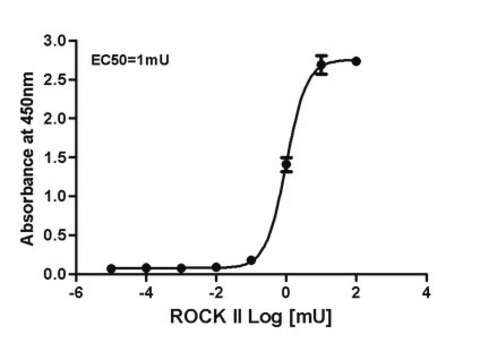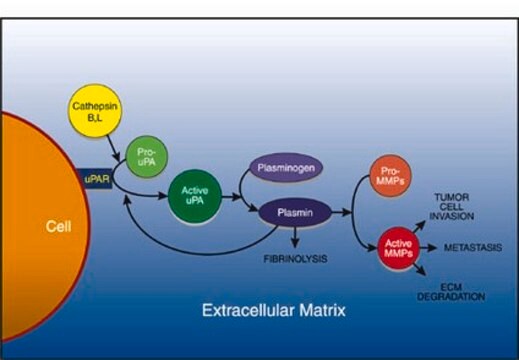Vybrat velikost
25 700,00 Kč
25 700,00 Kč
O této položce
Přeskočit na
Název produktu
Rho-associated Kinase (ROCK) Activity Assay, This Rho-associated Protein Kinase (ROCK) Activity Assay Kit is an enzyme immunoassay for detection of the active ROCK & DMPK family kinases.
species reactivity (predicted by homology)
all
manufacturer/tradename
Chemicon®
technique(s)
activity assay: suitable
detection method
colorimetric
shipped in
ambient
1 of 4
Tato položka | ECM600 | 555553 | 555550 |
|---|---|---|---|
| technique(s) activity assay: suitable | technique(s) activity assay: suitable | technique(s) - | technique(s) - |
| species reactivity (predicted by homology) all | species reactivity (predicted by homology) - | species reactivity (predicted by homology) - | species reactivity (predicted by homology) - |
| manufacturer/tradename Chemicon® | manufacturer/tradename Chemicon® | manufacturer/tradename Calbiochem® | manufacturer/tradename Calbiochem® |
| detection method colorimetric | detection method colorimetric | detection method - | detection method - |
| shipped in ambient | shipped in dry ice | shipped in ambient | shipped in ambient |
Application
The ROCK assay kit is designed to determine the presence and relative amount of purified ROCK activity as well as for screening inhibitors or activators of ROCK or DMPK family kinases. It can also be used to assess the potency of pharmacological agents on ROCK or DMPK family kinases.
General description
Small GTPase proteins of the Rho family are pivotal regulators of several aspects of cell behavior, such as cell motility, cell proliferation and apoptosis. They have a central role in many motile responses that involve the actin cytoskeleton and/or microtubule network, from neurite extension to phagocytosis and cancer-cell invasion. In addition, they contribute to changes in gene expression that lead to cell-cycle progression or differentiated cell responses. Rho is activated by extracellular signals such as lysophosphatidic acid (LPA). The actions of Rho are mediated by downstream Rho effectors. One of these effectors is Rho-associated protein kinase (ROCK). Two ROCK isoforms have been identified: ROCK-I (also known as ROKβ) and ROCK-II (also known as Rho Kinase and ROKα). ROCK mediates Rho signaling and reorganizes the actin cytoskeleton through phosphorylation of several substrates that contribute to the assembly of actin filaments and contractility.
ROCK inactivates myosin phosphatase through the specific phosphorylation of myosin phosphatase target subunit 1 (MYPT1) at threonine residue 696, which results in an increase in the phosphorylated form of the 20 kDa myosin light chain (MLC20). This threonine residue may also be phosphorylated by myotonic dystrophy protein kinase (DMPK) family kinases.
Test Principle:
Millipore’s Rho-associated Protein Kinase (ROCK) Activity Assay Kit is an enzyme immunoassay for detection of the active ROCK and DMPK family kinases. Plates are pre-coated with recombinant MYPT1, which contains a Thr696 residue that may be phosphorylated upon addition of ROCK-I, ROCK-II, or DMPK. A detection antibody that specifically detects only MYPT1 phosphorylated at Thr696 is then applied. Subsequently, an HRP-conjugated secondary detection antibody is added. The amount of phoshorylated substrate is measured by addition of the chromogenic substrate tetra-methylbenzidine (TMB), which bound HRP converts from a colorless solution to a blue solution (or yellow after the addition of stop solution). The absorbance signal at 450 nm reflects the relative amount of ROCK activity in the sample.
The ROCK assay kit is designed to determine the presence and relative amount of purified ROCK activity as well as for screening inhibitors or activators of ROCK or DMPK family kinases.
Other Notes
Anti-phospho-MYPT1(Thr696) Antibody: One vial containing 10 µg of anti-phospho-MYPT1(Thr696) antibody
TMB/E Substrate: One bottle containing 12 mL
Stop Solution: One bottle containing 12 mL
TBS, 20X: One bottle containing 50 mL 20X TBS
20% Tween® 20 (v/v): One bottle containing 3 mL
Plate Sealers: Two plate covers
Assay Dilution Buffer I: One vial containing 1 mL
ATP (10mM): One vial containing 50 µL
MgCl2 (1M): One vial containing 100 µL
30% BSA: One vial containing 1 mL
Goat Anti-Rabbit IgG HRP Secondary Antibody: One vial containing 30 µL
ROCK Inhibitor Y-27632: One vial containing 150 µL
Active Rho-associated Kinase II (ROCK-II): One vial containing 10 µg
Preparation Note
Legal Information
signalword
Warning
hcodes
Hazard Classifications
Met. Corr. 1 - Skin Sens. 1
Skladovací třída
8A - Combustible corrosive hazardous materials
Osvědčení o analýze (COA)
Vyhledejte osvědčení Osvědčení o analýze (COA) zadáním čísla šarže/dávky těchto produktů. Čísla šarže a dávky lze nalézt na štítku produktu za slovy „Lot“ nebo „Batch“.
Již tento produkt vlastníte?
Dokumenty související s produkty, které jste v minulosti zakoupili, byly za účelem usnadnění shromážděny ve vaší Knihovně dokumentů.
Active Filters
Náš tým vědeckých pracovníků má zkušenosti ve všech oblastech výzkumu, včetně přírodních věd, materiálových věd, chemické syntézy, chromatografie, analytiky a mnoha dalších..
Obraťte se na technický servis




